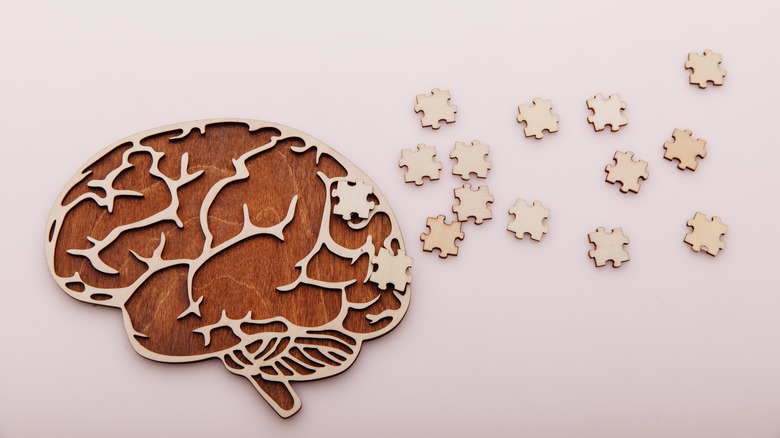Study Reveals How Even A Small Amount Of Alcohol Affects Your Brain
It's widely known that excessive and sustained alcohol intake can have a detrimental effect on the brain (via Northwestern Medicine). On the other hand, most people wouldn't be majorly concerned about knocking back a glass of wine or two. Moderate drinking is socially accepted in most western cultures. Even guidelines from the National Institute on Alcohol Abuse and Alcoholism state that men can safely consume two alcoholic beverages or less a day and that women should limit themselves to one drink a day.
But light-to-moderate drinking might be having more of an impact than previously thought, according to a 2022 study published in the journal Nature Communications. The researchers discovered a significant link between drinking alcohol and a loss of brain volume. Their findings showed that drinking on a daily basis can shrink the brain and that brain atrophy can start at levels of alcohol consumption that most people would consider modest or even trivial.
Drinking every day may speed up brain aging
The researchers analyzed data from more than 36,000 adults aged between 40 to 69 (via Nature Communications). They found that the more alcohol people consumed, the greater the loss in their overall brain volume.
According to the results discovered, increasing one's alcohol consumption from one to two units a day was linked to around two years of aging. Meanwhile, individuals who exceeded the recommended alcoholic consumption level and took their intake from two to three daily units (namely a large glass of wine or a pint of high-strength beer) exhibited a reduction in brain volume that was associated with three and a half years of aging.
The brains of those who drank even more, consuming four alcoholic units a day (just under half a bottle of wine), appeared to age by approximately 10 years, as compared to the brains of those who don't drink any alcohol at all.
Alcohol can shrink the brain in various regions
Based on the MRI scans of participants' brains, the researchers observed shrinkage of gray and white matter and overall brain volume. Gray matter is the part of the brain that's made up of cell bodies and nerve fiber and regulates things like motor control, and sensory perception, language processing (via Simply Psychology). White matter is the material that connects neurons to one another and enables communication between different areas of grey matter. A decrease in brain volume in either region is associated with cognitive degeneration.
In the study, structural damage was detected in the brain stem, putamen, and amygdala. These are areas of the brain that govern respiration, heart rate, learning and motor control, and process emotions like fear and anxiety. While there's extensive evidence for the strong association between heavy drinking and white and grey matter atrophy, much of the existing research is centered on individuals with alcohol use disorder rather than someone with healthier patterns, note the study authors (via Nature Communications).
Weighing up the risks and benefits of drinking
These findings throw into question the long-held assumption that regular and modest alcohol intake is generally harmless. The study shows that even a single daily glass of wine has the potential to deteriorate brain health, raising the question: Is no alcohol better than a little?
"One additional drink in a day could have more of an impact than any of the previous drinks that day. That means that cutting back on that final drink of the night might have a big effect in terms of brain aging," Remi Daviet, an assistant professor of marketing at the University of Wisconsin-Madison who worked on the study, stated in a press release for EurekAlert.
The media and scientists have also paid some attention to the benefits of alcohol in recent years. A 2018 study highlighted the possible anti-inflammatory effects of a glass of wine or a pint of beer each day, suggesting that drinking in moderation may help flush out toxins from the brain (via Scientific Reports).
What are the limitations of the study?
Earlier studies investigating the effects of alcohol on the brain have been mostly small and poorly controlled, say the study authors. "The fact that we have such a large sample size allows us to find subtle patterns, even between drinking the equivalent of half a beer and one beer a day," Gideon Nave, an author on the study and faculty member at Penn's Wharton School, told EurekAlert. The researchers also accounted for factors that might influence brain aging, such as gender, age, smoking status, socioeconomic status, and genetic ancestry, among other variables.
"A problem in this study is that they only have information on people's drinking habits for the one year prior to the (brain) imaging," Emmanuela Gakidou, an alcohol researcher and professor at the University of Washington, told CNN Health. "It's likely that the cumulative consumption of alcohol throughout one's lifetime is associated with the brain, not just the level of consumption right before the images were taken."
The relationship between alcohol and health remains a puzzle, according to Gakidou. "Based on this study, I would not really draw any definitive conclusions, but I would say that the authors have identified areas for further research," she told CNN Health.




